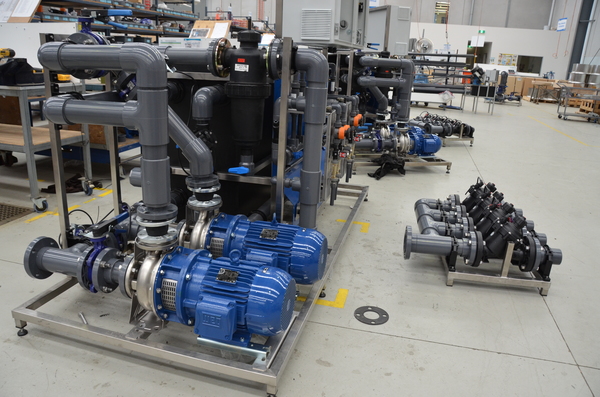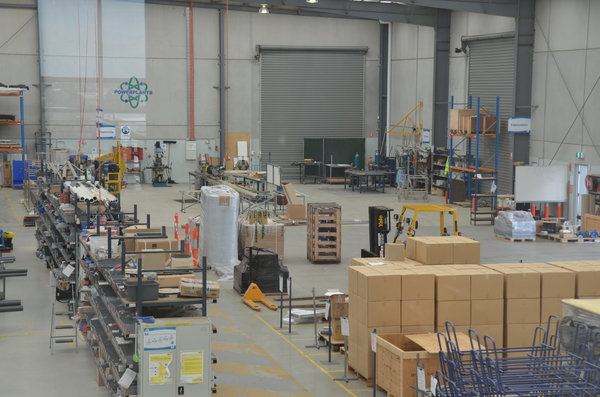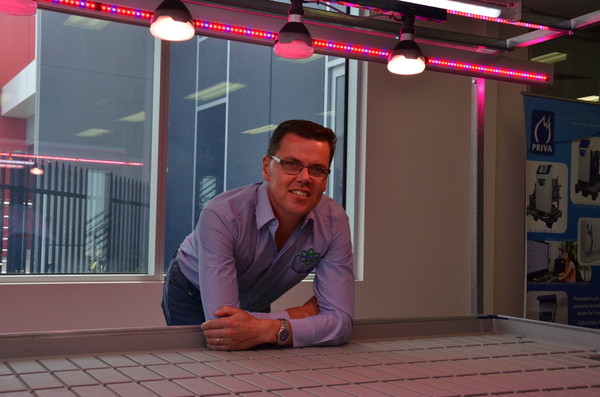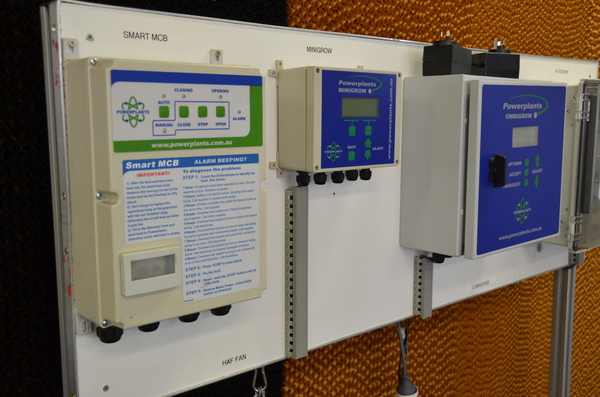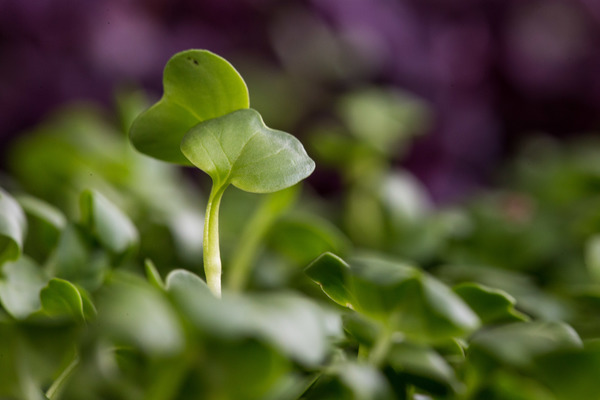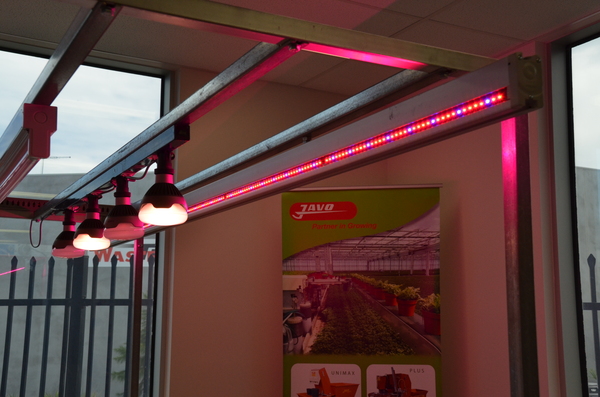
Farming is moving indoors and Powerplants is helping with the transition.
“Lots more field growers are converting to semi-protected growers,” director Carl van Loon said.
“That’s where we see quite a lot of growth in the industry.
“The weather’s not getting any easier to manage, it’s getting generally wilder.
“Farmers can handle a small change every year with temperature.
“What they can’t handle is the big storms that that brings.
“More and more we need to protect those growers from that.”
Carl said the technology feeding vertical farming was developing.
“The LEDs are getting better, more efficient,” he said.
“Every year they get a bit better and faster and cheaper.
“LEDs are one of the biggest parts of that whole vertical farming picture.
“As they get more efficient and cheaper, it will make vertical farming become really realistic.
“In some places, it’s already a serious production system.”
He said Singapore, Hong Kong and Japan turned to vertical farming due to limited space.
“The secret to getting the vertical farming right really is growing without growers, growing without the green thumb,” he said.
It’s about fully-automated growing systems.
“You take all the guesswork out and turn it into a production process,” he said.
“With plants there are generally so many variables – weather, insects, disease …
“If you can make it into a totally predictable model, you can do it anywhere in the world.
“It’s part of the future of the industry. We’re probably not quite there yet in Australia.
“It is an exciting industry at the moment.
“There’ve been so many ups and downs over the years.
“There’s always something that’s exciting that’s coming up.
“Medical cannabis could be big.
“We don’t know anything about it at the moment but eventually it will be an industry in Australia as well.
“That’s something we’ve got our eyes on.”
Powerplants was born in 1994.
“I was working for my dad and we had a plant nursery,” Carl said.
“I used to do all this technical work for him – climate control systems and all that sort of stuff.
“I was self-taught.
“Whenever I was buying things, we were buying greenhouse equipment from chicken shed manufacturers.
“There wasn’t a proper horticulture industry.
“You were buying stuff from people who didn’t know anything about plants.
“I realised there was a niche for it and started the business with a couple of family members.
“We gradually built it up from there.
“I had no intention whatsoever of getting into the horticulture industry.
“I was going to be an engineer.
“Somehow it drew me back.”
He puts it down to the down to earth people involved.
“That’s what really drew me back to it. It’s just a really nice industry to be in,” he said.
He started out with his brother and mum.
“She was doing the books and handling the financial side. Me and my brother were doing all the sales and design,” he said.
“We bought them out, went on our own.”
Today Powerplants employs about 31 people, down from a height of 44 over the past year due to “a bit of a recession”.
“There’s so much Dutch competition in Australia now,” he said.
“They’ve been having a terrible time over there so they’ve been coming over here more.
“It’s just starting to get busier in Europe again.”
So Carl is hopeful the tide will turn.
He said the business started off “very different to what it is now”.
“We used to just do equipment for nurseries, for greenhouses,” he said.
“Then the business grew and grew and the market changed.
“Now food production is the major part of the business.
“We design and install and service systems for growing food.
“Tomatoes, capsicums, cucumbers, eggplants, lettuce, leafy greens, herbs – basically anything that grows in the ground or grows in greenhouses, that’s our main target now.
“We’ll always need to eat.
“People seem to be moving towards better and better quality and that’s what we’re all about – helping growers to produce really high quality crops without pesticides, without fungicides and sprays by giving the plants a really good climate.”
Carl said people often thought plants were grown “in little greenhouses with a hose like a backyard greenhouse”.
“Some of the projects now are 2000 square metres,” he said.
“The technology is getting at a high level.
“It’s a niche, it’s a relatively unknown niche and it’s definitely a growing industry.
“It’s got everything going for it – it’s got no nasty emissions, we’re producing food that people want – not processed food, it’s all fresh food.
“It improves people’s lives.
“That’s one of the main interests of the business is to be improving people’s lives.”
Carl said farmers would usually have a couple of good years followed by two or three bad ones.
“Sometimes they’d go broke because they didn’t have enough good years in a row,” he said.
“We’re taking that risk out.
“You can have low prices, but there’s not a risk of a big hail storm taking out the whole crops.
“You could have a beautiful cherry crop just before Christmas when everyone wants cherries then get rain.
“The cherries start cracking and they’re worthless.
“We’ve been setting up these protective structures for cherry growers, tomato growers, strawberries, capsicums – basically anything that’s vulnerable to bad weather.
“But we also import and manufacture the water systems that fertilise the plants.
“It starts with the greenhouse and then you work your way down.
“We do recycling units that reclaim all the fertiliser so you can use it again and again, instead of half the fertiliser running down the drain.”
Carl said that in a typical greenhouse, basically you built a shell that was then going to heat up fast on a hot day.
“We have to put in some systems to cool it down. We put in things like automated shade screens, fog systems…circulation fans to keep the air moving.
“Then you’ve got to think about heating it up at night time. We have heating systems for getting the climate right.”
Different coloured LED lights control how plants grow. Red promotes generative growing, encouraging the plant to flower and produce more fruit.
Blue encourages vegetative growth, producing more leaves.
“People are getting quite interested in controlling the plants,” Carl said.
Then there are the components that hold the plants.
“Some crops are grown in gutters,” Carl said.
“A lot of growers can’t grow in the soil anymore because the soil is so depleted.
“Or maybe they want to grow near the city and save on travel.
“We can do systems that use artificial media like coconut fibre or rock wool, which is made from spun basalt.
“Then we do the systems to supply the water to the crop, via drippers usually.”
Powerplants make systems that deliver nutrient into the water, too, and treat the water for reuse.
The company has tanks to store the water, and control systems to cover from temperatures to humidity and fertilisers.
“You can look at it on the screen and see ‘what am I doing today?’” he said.
There are harvesting systems and trolleys for accessing crops like tomatoes.
“For some crops, we do automated moving bench systems – lots of things to do with saving labour,” Carl said.
“It’s an extremely-labour intensive industry.
“It’s very hard to get enough labour in a lot of places.”
Powerplants mostly works with people who already have greenhouses and want to improve them.
“At the moment we’re getting a lot more corporate interest in the industry,” he said.
“What’s the next big place to invest?
“That seems to be agribusiness.”
Powerplants designs, builds, installs and services across the country and beyond.
“There really isn’t anyone else in Australia that can provide the servicing,” Carl said.
“We have some work overseas as well.
“We’re actively seeking more work overseas.
“We make quite a lot of equipment in the factory here.
“We design those systems ourselves. We have engineers for designing the systems.
“We also outsource some of the laser cutting and stuff like that out to local businesses.
“We don’t import anything from China – except one part we couldn’t get made anywhere else.
“We’re still very much high quality, and reliability – either locally-produced or from Europe.”
Powerplants is playing a key role in progressing the industry.
“We’re involved in quite a few large projects that are very interesting,” Carl said.
“Some are research, so government doing research. Some are private industry doing research in greenhouses.
“There’s quite an interest in vertical farming and urban farming.
“I think we’ll be involved with some projects in Melbourne soon.”
Carl said that Melbourne’s Queen Victoria Market would install a greenhouse and produce crops.
“I think it will become quite a tourist attraction,” he said.
“In the middle of the city they’ll be producing these crops.”
Powerplants’ customers include last year’s Casey Cardinia Business of the Year award winner and past On the Land feature, Clyde and Devon Meadows-based Australian Fresh Leaf Herbs.
“They’ve gone from being quite a low-tech producer to increasing their technology quite a lot,” Carl said.
“The rate of growth of that business is incredible.
“They’ve got a real vision for the future and they’re very actively pursuing that.”


